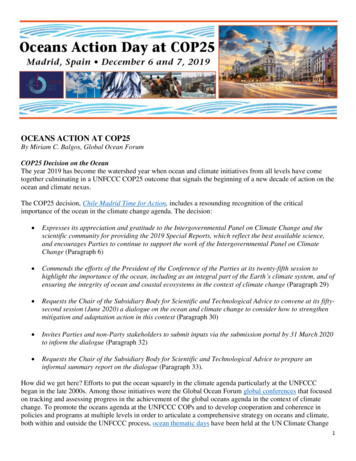
Transcription
OCEANS ACTION AT COP25By Miriam C. Balgos, Global Ocean ForumCOP25 Decision on the OceanThe year 2019 has become the watershed year when ocean and climate initiatives from all levels have cometogether culminating in a UNFCCC COP25 outcome that signals the beginning of a new decade of action on theocean and climate nexus.The COP25 decision, Chile Madrid Time for Action, includes a resounding recognition of the criticalimportance of the ocean in the climate change agenda. The decision: Expresses its appreciation and gratitude to the Intergovernmental Panel on Climate Change and thescientific community for providing the 2019 Special Reports, which reflect the best available science,and encourages Parties to continue to support the work of the Intergovernmental Panel on ClimateChange (Paragraph 6) Commends the efforts of the President of the Conference of the Parties at its twenty-fifth session tohighlight the importance of the ocean, including as an integral part of the Earth’s climate system, and ofensuring the integrity of ocean and coastal ecosystems in the context of climate change (Paragraph 29) Requests the Chair of the Subsidiary Body for Scientific and Technological Advice to convene at its fiftysecond session (June 2020) a dialogue on the ocean and climate change to consider how to strengthenmitigation and adaptation action in this context (Paragraph 30) Invites Parties and non-Party stakeholders to submit inputs via the submission portal by 31 March 2020to inform the dialogue (Paragraph 32) Requests the Chair of the Subsidiary Body for Scientific and Technological Advice to prepare aninformal summary report on the dialogue (Paragraph 33).How did we get here? Efforts to put the ocean squarely in the climate agenda particularly at the UNFCCCbegan in the late 2000s. Among those initiatives were the Global Ocean Forum global conferences that focusedon tracking and assessing progress in the achievement of the global oceans agenda in the context of climatechange. To promote the oceans agenda at the UNFCCC COPs and to develop cooperation and coherence inpolicies and programs at multiple levels in order to articulate a comprehensive strategy on oceans and climate,both within and outside the UNFCCC process, ocean thematic days have been held at the UN Climate Change1
Conference since COP15 in Copenhagen. In the Marrakech COP (COP22), oceans became one of the thematicareas covered by the Marrakech Partnership for Global Climate Action, formed to support the implementationof the Paris Agreement by enabling collaboration among governments, cities and regions, businesses, and civilsociety that must act on climate change.The oceans community, led by “Friends of the Ocean” Parties and non-Party stakeholders, have since then madesignificant progress in promoting the ocean agenda at the COPs. COP23, with the Fiji presidency, was a keyturning point in strengthening the oceans dialogue and the ocean-climate nexus. The Fijian COP23 Presidencylaunched the Ocean Pathway Partnership at COP23, co-chaired by Fiji and Sweden, to encourage the climatenegotiations process to address the relationship between climate change and the ocean, which eventually led tothe development of a tangible plan to effectively address oceans and coastal issues at COP25.The IPCC Special Report on the Ocean and Cryosphere in a Changing Climate and the IPCC Special Report onGlobal Warming of 1.5 C became the springboard for greater oceans and climate action and the setting ofhigher ambitions for oceans and climate action. In particular, the SROCC, approved on 24 September 2019 bythe 195 IPCC member governments, provided new evidence on the benefits of limiting global warming to thelowest possible level in line with the Paris Agreement goal. According to the report, urgently reducinggreenhouse gas emissions would limit the scale of ocean and cryosphere changes and adverse impacts on theecosystems and the people that depend on them.The UN Secretary General’s Climate Action Summit was held on 23 September 2019 to increase ambition andfast-track actions to implement the Paris Agreement, and to exhibit countries’ concrete and realistic plans toenhance their nationally determined contributions by 2020 and to achieve net zero emissions by 2050.Government leaders were invited by Secretary-General António Guterres to present plans, not make speeches atthe Summit. Seventy (70) countries, which account for less than 10 percent of the world’s GHG emissions,committed to deliver more ambitious national climate plans in 2020 in line with net zero emissions by 2050strategies while some countries “committed to commit” to new plans by the end of 2020. Seventy-five (75)countries committed to deliver 2050 net zero emissions strategies by 2020. Among the announcements made atthe Summit (see Summit Press Release) were initiatives on nature-based solutions to climate change mitigationand adaptation, including: 1) the Global Campaign for Nature, to be launched by several countries, which aimsto conserve 30 percent of the Earth’s lands and oceans by 2030; 2) A new initiative by Central Americancountries, which aims, by 2030, to establish and manage 10 million hectares of "sustainable productivelandscapes that are resilient to climate change," with a goal of no less than 40 percent reduction in emissionsfrom the baseline year of 2010; and 3) A High-Level Panel for the Sustainable Ocean Economy, representing 14countries that cover approximately 30 percent of the world's coastlines, 30 percent of the world’s exclusiveeconomic zones, 20 percent of the world’s ocean catch, and 20 percent of the world’s shipping fleet, including anew initiative to build resilience for the ocean and marine-protected areas. (Climate Action Summit 2019 PressRelease)In recognition that the ocean is an essential part of Chile’s national identity and of the increasing importance ofocean issues to the Parties, the Chilean Presidency of COP25 made the ocean a key theme of its presidency,dubbing COP25 as the Blue COP (Ocean Conservancy 2019). At COP25, like-minded countries, in particularIndonesia and Costa Rica-led IALAC (Independent Alliance of Latin America and the Caribbean) countries,Spain, the EU, Tuvalu, Belize for AOSIS, Marshall Islands, Canada, Norway, Egypt for the African Group,Australia, New Zealand, Russian Federation, Argentina, Bhutan for the LDCs, Switzerland for theEnvironmental Integrity Group (EIG), and Saudi Arabia, supported putting oceans in the UNFCCC agenda, i.e.,inclusion of a SBSTA dialogue on the ocean and climate change to consider strengthening mitigation andadaptation in this context (IISD 2019a).2
The Oceans Action Day at COP25The Oceans Action Day at COP25 was held over two days (6-7 December 2019), which included: 1) theMarrakech Partnership for Global Climate Action Oceans and Coastal Zones Action Event (6 December); 2)Oceans Action Day (7 December); 3) EU Ocean Day (7 December); 4) UK Pavilion Events; and 5) OfficialUNFCCC COP25 ocean-related side events (SEORS events).The Oceans Action Day (7 December), which drew over 200 participants from 31 countries representinggovernments, IGOs, and civil society, assessed existing ocean and climate action and identified the gaps thatneed to be addressed. While there has been some discussion/work in various bodies and processes of theUNFCCC on the oceans and climate nexus, these do not correspond to the magnitude and importance(environmental, social, and economic) of the oceans and climate interface. The Oceans Action Day at COP25highlighted, in particular, the policy implications of the IPCC Special Reports on the Ocean and Cryosphere in aChanging Climate and on Global Warming of 1.5 C and debated possible avenues for policy actions in responseto these analyses. The Oceans Action Day at COP25 are summarized below.Oceans Action Day on 7 December was organized by: The Global Ocean Forum; the IntergovernmentalOceanographic Commission (IOC) of UNESCO; the Food and Agriculture Organization of the UN (FAO); theOcean Policy Research Institute of the Sasakawa Peace Foundation, Japan; Oceano Azul Foundation, Portugal;Plymouth Marine Laboratory, UK; International Union for Conservation of Nature; Because the OceanInitiative; the Ocean and Climate Platform; The Carbon Institute; Coastal Zone Canada Association; and theInternational Alliance to Combat Ocean Acidification. The event was held in collaboration with theGovernments of Chile, the European Union, Fiji, Indonesia, Japan, Sweden, and the United Kingdom.The financial support of the Ocean Policy Research Institute of the Sasakawa Peace Foundation, Japan;Oceano Azul Foundation, Portugal; and the Global Ocean Forum is acknowledged with sincere thanks.In addition to the Oceans Action Day at COP25, an unprecedented number‒over 80‒of ocean-related eventsintensified the focus on the ocean and climate nexus at COP25, adding many voices from around the world onthe urgency of the issues involved and on the policy issues that must be rapidly pursued. The list of oceanevents was tracked by Ocean Conservancy on behalf of the Chile COP25 Presidency.Oceans Action Day at COP25 consisted of five High-Level Panels and was hosted by the Governments ofJapan, Chile, and the UK: 1) The Oceans and Climate Nexus within the UNFCCC and Beyond (Japan Pavilion);3
2) Incorporating Ocean-Related Options in Nationally Determined Contributions (NDCs) (Japan Pavilion); 3)Ocean Science to Action for Adaptation and Displacement Solutions (Japan Pavilion); 4) Galvanizing Supportfor Oceans and Climate Action (Chile Pavilion); and 5) Oceans Action Day at COP25 Reception (UnitedKingdom Pavilion).The Oceans Action Day featured the Roadmap to Oceans and Climate Action (ROCA) Initiative’s 2019Progress Report on Oceans and Climate, which highlighted the findings of the SROCC and Global Warming of1.5 C reports, emphasizing that that the predictions of climate change impacts on oceans and coastalcommunities will happen much earlier than expected. The report stresses that: 1) both the SROCC and SR15make clear that what is at stake is the health of ocean biodiversity and ecosystems, their ecosystem services, thewell-being and health of millions of people living in low-lying and coastal communities, and, most importantly,the world we leave our children; 2) the more decisively and earlier we act, the more able we will be to addressunavoidable changes, manage risks, improve our lives, and achieve sustainability for ecosystems and peoplearound the world, both today and in the future; and 3) the time for action is clearly now, not tomorrow.The financial support of the Ocean Policy Research Institute of the Sasakawa Peace Foundation, Japan;Oceano Azul Foundation, Portugal; and the Global Ocean Forum for the preparation of the 2019 ProgressReport is acknowledged with sincere thanks.Oceans Action Day at COP25 Session 1 on The Oceans and Climate Nexus within the UNFCCC andBeyond focused on key challenges posed by the findings of the IPCC Special Reports on the Ocean andCryosphere in a Changing Climate and on Projected Impacts of Global Warming of 1.5 C. This panel alsofeatured the 2019 Progress Report on Oceans and Climate Action prepared by Party and non-Party stakeholderswhich emphasized the urgency provided by the IPCC reports for developing updated climate policies in supportof action pathways on oceans and coastal zones. Panelists underscored that:1) Oceans are integral to achieving multiple SDGs, noting the example of the Osaka Blue Ocean Vision whichwas adopted by the G20 Summit in June 2019 to address ocean litter and plastic as part of efforts to respondto ocean-related challenges;2) The 2017 UN Ocean Conference played a key role in creating awareness and understanding of the oceanclimate nexus, noting that nature-based solutions, such as the International Blue Carbon Initiative, focuseson mitigation through blue carbon restoration;3) The importance of prioritizing rehabilitation of coastal and marine ecosystems, including mangroves, inNDCs;4
4) The need for a blue outcome at this Blue COP, noting the High Ambition Coalition for Climate and Natureto build ambition in combating climate change, which is creating awareness on the climate-oceans nexus;5) Bold, coordinated, cooperative action is needed to address the climate-ocean nexus, noting theCommonwealth Blue Charter, which puts oceans and island nations that are “big ocean states” at the centerof climate solutions;6) The importance of investment in adaptation, noting that mitigation is not adequate to avert the climate crisis,noting the Blue Action Fund, established by Sweden, France and Germany, that will support investment innature-based solutions, and for integrated approaches on the effects of land-based activities on the marineenvironment;7) Sustained progress in prioritizing the ocean agenda since COP23, especially through the initiatives of theFiji presidency of COP23 in strengthening the dialogue on the ocean-climate nexus;8) The need for a common narrative encompassing the needs of all ocean-dependent people, bearing in mindthat the people who will never come to COPs are those that are most in need of solutions to challenges onthe ground.Participants and panelists considered, among others, the best possible outcome for oceans at COP25, including:linking the UNFCCC, the Convention on Biological Diversity (CBD) and the negotiations on biodiversity ofareas beyond national jurisdiction (BBNJ) for a unified voice on the ocean; implementing the Nairobi workprogramme on impacts, vulnerability, and adaptation to climate change; and integrating solutions for the oceaninto UNFCCC processes (IISD 2019b).Oceans Action Day at COP25 Session 1.L-R, Standing: Richard Delaney, President, Centerfor Coastal Studies, US and Board of Directors,Global Ocean Forum; Atsushi Sunami, President,Ocean Policy Research Institute of the SasakawaPeace Foundation, Japan; Safri Burhanuddin,Deputy Minister for Human Resources, Science,Technology and Maritime Culture, CoordinatingMinistry for Maritime Affairs, Indonesia; BilianaCicin-Sain, President, Global Ocean Forum, andRoadmap to Oceans and Climate Action (ROCA)Initiative; Haydée Rodríguez Romero, ViceMinister, Ministry of Environment and CoastalAffairs, Costa Rica; Taholo Kami, SpecialRepresentative for the Ocean Pathway, COP23Presidency Secretariat, FijiL-R, Seated: Tiago Pitta e Cunha, CEO, OceanoAzul Foundation, Portugal; Nick HardmanMountford, Head of Oceans and Natural Resources,Commonwealth Secretariat; Helen Ågren,Ambassador for the Ocean, Ministry for ForeignAffairs, Sweden; and Manuel Barange, Director,Fisheries and Aquaculture Policy and ResourcesDivision, FAO ( IISD)Oceans Action Day Session 2 on The Oceans and Climate Nexus within the UNFCCC and Beyond identifiedmeasures for the integration of key ocean issues within NDCs, including taking into account recommendationscontained in the recent Because the Ocean and Institute for Sustainable Development and InternationalRelations (IDDRI) publications on integrating the ocean into NDCs. Speakers emphasized:1) Opportunities for increasing ocean action in climate action strategies;2) 2020 NDCs need to include nature-based solutions;5
3) MPAs can contribute to mitigation and adaptation, including ocean acidification and deoxygenation, andcreating barriers to sea-level rise;4) Blue carbon is important, thus countries need to include ecosystems in their national greenhouse gasinventories (see the CI Guide to Including Nature in NDCs);5) Unabated, climate change will cause over 90% loss of the current USD 36 billion revenue from coral reefs,highlighting the need to include the insurance sector in modeling climate risk, and developing fiscalmitigation policies and products;6) Countries need to work their way towards a renewable energy pathway, citing that ocean-thermal energytechnologies can produce decarbonized energy in a predictable way, while providing jobs;7) Full decarbonization of the shipping industry by 2050 could be attained and that the reduction of ship-speedby 20% translates to a 34% reduction in carbon emissions;8) Wind energy combined with the reduction in ship speeds is imperative to the reduction of emissions fromthe shipping sector;9) The survival of small islands depends on urgent action by 2030, noting the co-benefits for biodiversity andculture.Participants also took note of opportunities for partnership with Africa thorough the Africa Day of Seas andOceans, the Africa Strategy of Oceans, and the work of the Africa Blue Economy Champion, who is currentlythe President of Seychelles (IISD 2019b).Oceans Action Day at COP25 Session 2. L-R: RémiParmentier, Coordinator, Because the OceanInitiative; Loreley Picourt, Secretary General, Oceanand Climate Platform; Cameron Diver, DeputyDirector-General, Pacific Community; MonicaVerbeek, Executive Director, Seas At Risk; JoachimClaudet, National Center for Scientific Research;Emily Pidgeon, Senior Director, Strategic MarineInitiatives, Conservation International; Lisa Levin,Scripps Institution of Oceanography, University ofCalifornia, San Diego; Rémi Collombet-Gourdon,Policy Officer, Ocean Energy Europe; Karen Sack,Managing Director, Ocean Unite; and Marc VanPeteghem, CEO, Van Peteghem Lauriot-Prévost(VPLP Design) ( IISD)Oceans Action Day at COP25 Session 3 on Ocean Science to Action for Adaptation and DisplacementSolutions drew perspectives from high-level representatives of intergovernmental organizations and civilsociety on how to take advantage of existing knowledge and opportunities associated with adapting to climatechange in developing, disseminating, and using adaptation and displacement policies and practices in thecontext of oceans and zones.Based on the rationale that innovative adaptation mechanisms and linkages to mitigation to tackle theimmediate threats of the climate emergency are critically needed, especially by those suffering the highestexposure to climate disasters but have the least capacity to adapt, this panel provided insights on how toadvance adaptation, including:1) Fishing vessels are collecting marine litter and are part of the circular economy, and other solutions tomarine conservation besides MPAs exist;2) Displacement policies and practices, pointing to island land tenure systems, can exacerbate or ameliorate thechallenges related to internal relocations;6
3) Opportunities for strengthening adaptation measures exist through the Global Compact for Safe, Orderlyand Regular Migration (GCM), an intergovernmental non-binding agreement that focuses on climate relatedmigrations and displacement;4) Protections for people displaced due to climate-related disasters and climate change are being supported byUNHCR, through the Platform on Disaster Displacement;5) An integrated risk management approach to bridge the climate-disaster divide, forecast-based actions toincrease resilience, and community-centered and driven actions are needed;6) Appropriate ecosystem management approaches and resilient water management are needed to managesediment flows in marine ecosystems, noting the need to build and maintain coastal ecosystems to mitigatedisasters.Participants raised the need for the identification of greater opportunities for cross-sectoral application ofadaptation mechanisms and the use of indigenous knowledge; shipping recyclable wastes through shippingcompanies in the Pacific Islands free of charge; and the importance of actionable forecast information and theurgent need for mitigation and adaptation to avoid displacement. (IISD 2019b)Oceans Action Day at COP25 Session 3. L-R: PeterRicketts, President and Vice-Chancellor, AcadiaUniversity, Canada, and Coastal Zone CanadaAssociation; Miko Maekawa, Senior Research Fellow,Ocean Policy Research Institute, Sasakawa PeaceFoundation, Japan; Javier Garat, Secretary General,Spanish Fishing Confederation and InternationalCoalition of Fishing Associations Chair; Mariam TraoreChazalnoel, Associate Expert, Migration, Environmentand Climate Change, IOM; Florence Geoffroy, AssociateLiaison Officer on Climate Change and DisasterDisplacement, UNHCR; Espen Ronnenberg, ClimateChange Adviser, SPREP; Donna Lagdameo, SeniorPolicy Advisor and Asia Pacific Focal Point, Red CrossRed Crescent Climate Centre; and Ingrid Timboe, PolicyDirector, AGWA ( IISD)Oceans Action Day at COP25 Session 4 on Galvanizing Support for Oceans and Climate Action featuredinterventions from high-level representatives of Parties and Non-State Parties to the UNFCCC on pre-2020climate action and raising ambition to achieve the goals of the Paris Agreement in the context of oceans andcoastal zones. In addition to shared information on what some countries and regions are doing to combatclimate change, strategies and opportunities on the way forward were presented. The need to break down thesilos among oceans, biodiversity, and climate in order to reverse the human-driven destruction was emphasized.The 2020 UN Ocean Conference (2-6 June 2020, Lisbon, Portugal) was presented as an opportunity to reinforcethe ocean-climate nexus, assess progress, and chart the way forward. A new project funding, to be consideredby the 58th GEF Council Meeting in 2019, aimed at strengthening MPAs to address carbon sequestration,biodiversity, and fisheries was announced. The opportunity offered by the UN Decade for Ocean Science forSustainable Development for achieving societal goals including a safe ocean, such that human communities andocean activities are much better protected from ocean hazards by promoting research aimed at minimizingimpacts of various changes and risk reduction through adaptation and mitigation was pointed out. The need toengage with the private sector and raising the price of carbon to incentivize decarbonization was discussed.(IISD 2019b)7
Oceans Action Day at COP25 Session 4. L-R: Tiago Pitta e Cunha, CEO, Ocean Azul Foundation; Amb. Álvaro Mendonça e Moura,Ministry of Foreign Affairs, Portugal; Anders Geertsen, Nordic Council of Ministers Secretariat; Amb. Peter Thomson, UN SpecialEnvoy for the Ocean; Ariel Troisi, Chair, IOC-UNESCO; James Njiru, Director of Kenya Marine and Fisheries Research Institute;Cristelle Pratt, Deputy Secretary General, Pacific Islands Forum Secretariat; Gustavo Fonseca, Director of Programs, GlobalEnvironment Facility; Nani Hendiarti, Director, Maritime Science and Technology, Indonesia; Biliana Cicin-Sain, President, GlobalOcean Forum; Patricia Fuller, Ambassador for Climate Change, Canada; Richard Delaney, President, Center for Coastal Studies,US and Board of Directors, Global Ocean Forum ( IISD)Oceans Action Day at COP25 was capped by a reception organized by the UK Foreign andCommonwealth Office and the Department for Environment, Food, and Rural Affairs; the Global OceanForum; and Plymouth Marine Laboratory, UK, where glasses were raised in hopes that on the road toCOP26 in Glasgow next year, a glass half-full rather than a glass half-empty would be the predominantperspective. It was noted that Oceans Action Day is key to spurring discussions on how best to tackle oceansand climate challenges, and along with more than 80 oceans events at COP25, has built on the momentum toinclude oceans on the agenda that has reached a crescendo at COP25. Attention was drawn to the importance ofinnovative strategies on the way forward such as a global ocean alliance to champion an increase by 30% ofglobal oceans under MPAs by 2030 to deliver blue nature-based solutions (IISD 2019b).A glass half-full is backed by: 1) some notable pre-2020 action, lessons learned and best practices reported fromall levels going forward; 2) the opportunity presented by the SBSTA dialogue on the ocean and climate changeon the part of the ocean community; and 3) a cascade of oceans activities in 2020 including: 1) 2020 UN OceanConference (2-6 June 2020, Lisbon, Portugal); 2) IUCN World Conservation Congress (11-19 June 2020,Marseille, France)); 3) 2020 UN Biodiversity Conference (24-28 February 2020, Kunming, China); 4)UNFCCC COP26 (9-19 November 2020, Glasgow, UK), which could serve the ocean community well inmobilizing for a successful COP26 for the ocean.8
Oceans Action Day at COP25 Reception at theUnited Kingdom Pavilion: L-R: Hugh Elliott, UKAmbassador to Spain and Andorra; Sharon OliveIkeazor, Minister, Federal Ministry ofEnvironment, Nigeria; Andrés Couve Correa,Minister of Science, Technology, Knowledge andInnovation, Chile; Biliana Cicin-Sain, President,Global Ocean Forum; Carol Turley, SeniorScientist, Plymouth Marine Laboratory, UK ( IISD)Oceans Action Day at COP25 Receptionparticipants( IISD)UNFCCC Friends of the Ocean Dinner, December 9, 2019The third in a series (following Bonn 2017 and Katowice 2018), the UNFCCC Friends of the Ocean Dinner washeld on December 9, 2019, bringing 48 representatives from Parties and non-Party stakeholders together forinformal discussion on how to best advance issues related to the oceans/and climate nexus within the UNFCCCand beyond. The Friends dinner took place at the Huerto de Lucas, an eco-minded, fully sustainable restaurantfocused on organic foods located in central Madrid.Speakers from Japan, Portugal, Sweden, Fiji, Indonesia, Commonwealth nations, and stakeholder organizations,spoke about their respective efforts in addressing ocean and climate issues, and stressed the importance ofinvestment in adaptation, especially in nature-based solutions, which countries are encouraged to include intheir NDCs. The need for restoration and more protection of marine ecosystems, especially mangroves wasemphasized, noting the importance of leaving these intact for future generations. It was pointed out, though, thatthe nature-based solutions cannot be done in isolation, and that these must be linked to mitigation andadaptation initiatives by other sectors. A keynote address was provided by the newly appointed Minister of theSea of Portugal, and former member of the European Parliament, H.E. Mr. Ricardo Serrão Santos, whounderlined the need to establish commitments among all countries with regard to the preservation of the oceans.9
10
Top-to-bottom, L-R: Atsushi Sunami, President, Ocean Policy Research Institute of the Sasakawa Peace Foundation, Japan; TiagoPitta e Cunha, CEO, Oceano Azul Foundation, Portugal; H.E. Ricardo Serrão Santos, Minister of the Sea of Portugal, and BilianaCicin-Sain, President, Global Ocean Forum; H.E. Helen Agren, Swedish Ambassador for the Ocean; Nani Hendiarti Anugrahadi,Director for Utilization of Maritime Science and Technology, Ministry of Maritime Affairs, Indonesia; Stephanie Ockenden, Headof Marine Evidence, DEFRA, UK; Stinna Bagge, YOUNGO Ocean Working Group; Kushaal Raj, Ocean Specialist, ClimateChange and International Cooperation Division, Ministry of Economy, Fiji; Nick Hardman-Mountford, Head of Oceans andNatural Resources, Commonwealth Secretariat; Hans-Otto Poertner, Co-chair, IPCC Working Group II. ( OPRI)Key Dates in 2020 for Advancing the Oceans and Climate NexusIn summary, Oceans Action Day at COP25 and related events emphasized that action on the oceans and climate nexusmust happen today, not tomorrow. The scientists have spoken loudly and clearly in the two IPCC reports. The youngpeople have spoken and have said “Do not rob us of our future.” The UN Secretary General has spoken and emphasizedthe climate emergency. Political leaders on every continent have spoken on the oceans and climate issues and the need forconcerted and ambitious action. And, UNFCCC leaders, in the COP25 closing decision, adopted the provision on oceanscalling for a considered examination of the ocean and climate issues in the run-up to COP26 in Glasgow, UnitedKingdom.It will be essential for the oceans community to plan early and effectively for the opportunities present in 2020.UNFCCC RelatedMarch 31, 2020, Inputs due to the UNFCCC by Parties and non-Party stakeholders on the dialogue on oceans and climatescheduled for the SBSTA meeting in June 2020June 1-11, 2020, 52nd Sessions of the UNFCCC Subsidiary Bodies: The 52nd sessions of the UNFCCC SubsidiaryBodies will be held in June 2020 in Bonn, Germany b-52). (A SBSTAdialogue on oceans is expected to be held during this session. Please note that the dates overlap with the UN OceanConference in Lisbon, June 2-6, 2020)November 9 to 19, 2020 UN Climate Change Conference (UNFCCC COP26): The 26th session of the Conference ofthe Parties (COP26), the 16th meeting of the Conference of the Parties serving as the Meeting of the Parties to the KyotoProtocol (CMP16), and the third meeting of the Conference of the Parties serving as the Meeting of the Parties to the ParisAgreement (CMA3) will convene in Glasgow, United Kingdom (https://unfccc.int)Other Major Related EventsMarch 23 to April 3, 2020, Fourth Session of the Intergovernmental Conference on an international legally bindinginstrument under the United Nations Convention on the Law of the Sea on the conservation and sustainable use ofmarine biological diversity of areas beyond national jurisdiction, New York11
June 2-6, 2020, 2020, UN Ocean Conference, Lisbon, PortugalJune 11-19, 2020, IUCN World Conservation Congress, Marseille, FranceAugust 17-18, 2020 Our Ocean Conference, PalauFinal quarter, 2020, 2020 UN Biodiversity Conference, Kunming, Yunnan, China12
the development of a tangible plan to effectively address oceans and coastal issues at COP25. The IPCC Special Report on the Ocean and Cryosphere in a Changing Climate and the IPCC Special Report on Global Warming of 1.5 C became the springboard for greater oceans and climate action and the setting of higher ambitions for oceans and climate .










